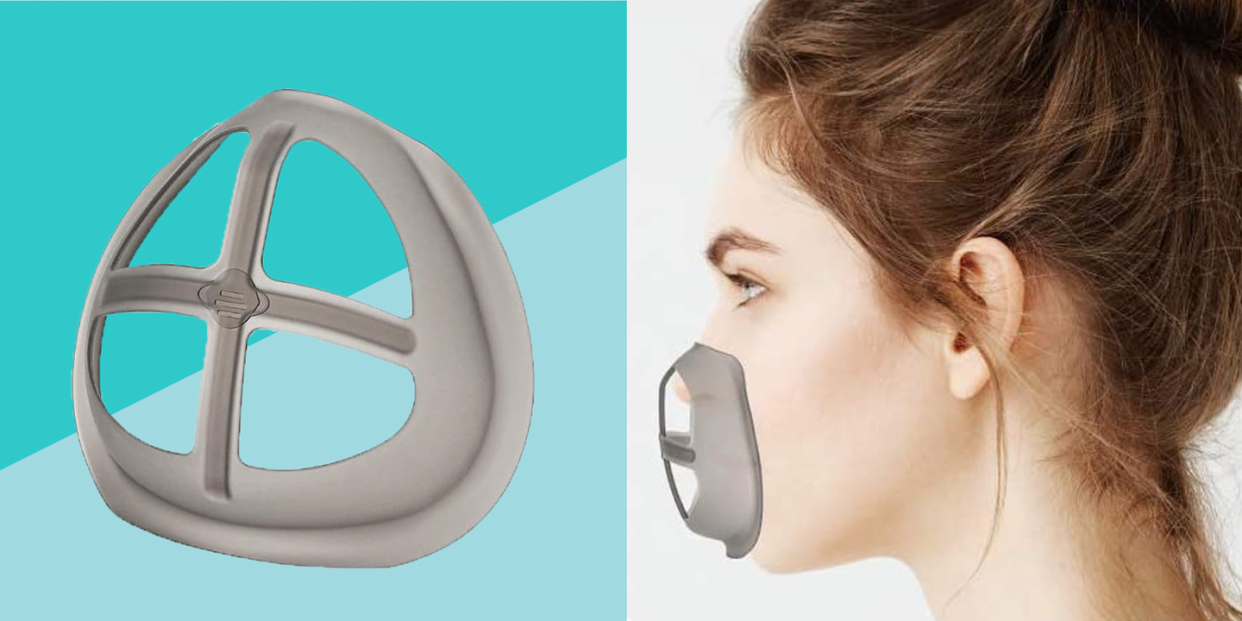Infectious Disease Experts Warn Against Face Mask Brackets, Which Are Rising in Popularity

There have been face mask trends practically ever since public health officials recommended their use back in April. People have tried face mask chains and ear-saving button bands, among other things. And now, there’s a new one to have on your radar: face mask brackets.
The brackets, which are also known as a mask brace, are usually made from silicone and are designed to keep your mask from touching your face. The goal: easier breathing, a lowered risk of maskne in the process, and even saving your makeup. Searches for these brackets have shot up on Google, and there are several options on Amazon right now.
Given that face masks are made to be worn to prevent the spread of COVID-19 and that these brackets keep your mask away from your face, it raises some obvious questions about safety. Here’s what you need to know.
How does a face mask bracket work, exactly?
While there are different bracket makers out there, the brackets all tend to have the same design. Each bracket has a pear shape, with a narrow top that fits over your nose and a wide bottom that nestles against your chin. In the middle is a T-shape that covers your nose and mouth, with sizable air vents in between.
The brackets have small hooks to secure them onto the inside of a surgical-style mask. From there, the bracket rests against your face, creating a barrier between your face and your mask.
So, are face mask brackets safe?
For the record: There is no data to suggest that these are any more or less safe than just wearing a mask. But infectious disease experts have some concerns, largely around how the bracket can impact how well your mask fits.
Face masks are designed to create a barrier between you and everyone else, and a good fit around your nose and mouth is an important element of that, says Richard Watkins, M.D., an infectious disease physician in Akron, OH, and a professor of internal medicine at Northeast Ohio Medical University. “Personally, I would not use this as I would be concerned about the integrity of the seal," he says.
William Schaffner, M.D., an infectious disease specialist and professor at the Vanderbilt University School of Medicine, agrees. “The bracket could make your mask less effective,” he says. “You would have to be really careful in using it.”
Most face mask brackets are designed to be used inside surgical-style masks, but Dr. Schaffner points out that there are other mask styles out there that people will likely try to use a bracket inside—and that could also make a mask less effective. “You really have to look to see whether the bracket disrupts the seal and opens things up around the edges of your mouth,” he says.
But Amesh A. Adalja, M.D., senior scholar at the Johns Hopkins Center for Health Security, says that the brackets seem to fit OK, at least when they're used as directed. "Based on how they look, I don't think they're going to make a huge difference [in safety]," he says. Still, he says, "this just underscores the need to do research on what types of masks people should or shouldn't be wearing. We have that for healthcare workers, but we don't have that for the general public."
On the skin front, a mask bracket could actually cause issues with a person's skin, says Gary Goldenberg, M.D., an assistant clinical professor of dermatology at the Icahn School of Medicine at Mount Sinai in New York City. "Silicone and plastic can irritate the skin, especially when in contact for a long time and weather is hot," he says, noting that some people might also have allergies to plastic, silicone, or any other components of the bracket. While the brackets can reduce direct contact of the mask with skin "it's still possible to get breakouts in the area of the support bracket," Goldenberg says. That's why he says that "the best solution for maskne is proper skincare and even prescription acne creams."
Overall, Dr. Schaffner recommends that people keep this in mind: “The mask is designed to protect both you and others and, if it doesn’t fit appropriately, it’s not doing that. You’re not wearing the mask for show; You’re wearing it for function.”
You Might Also Like